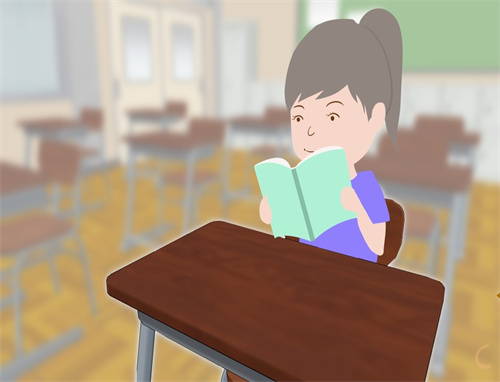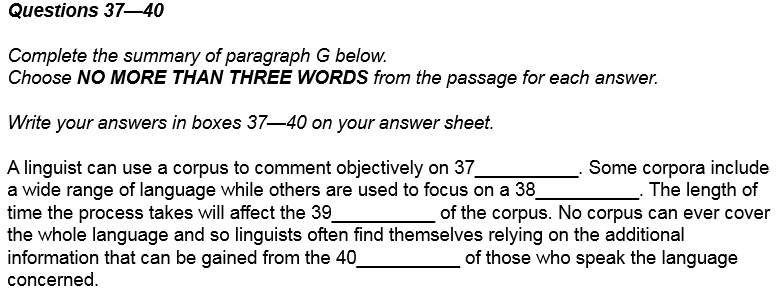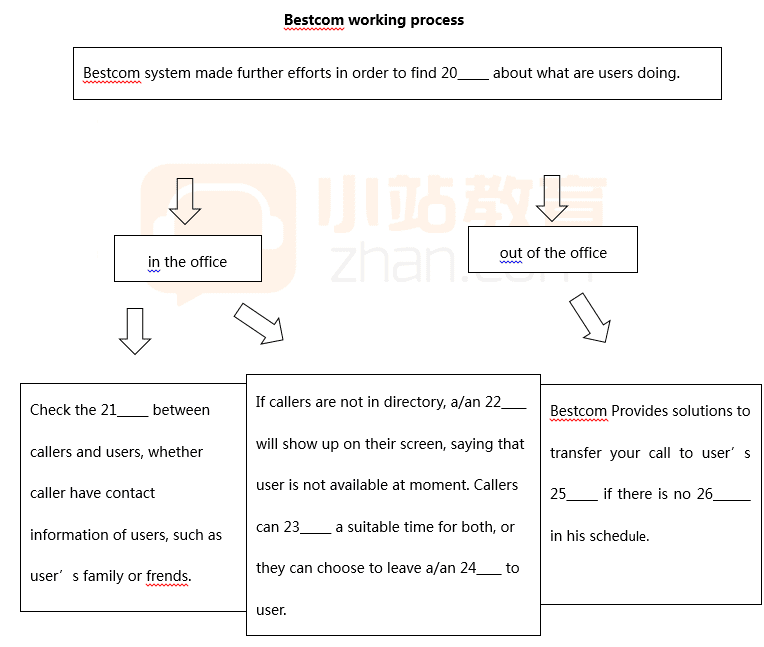你对GRE阅读有怎样的了解?今天小编给大家带来了GRE阅读的全面了解,希望能够帮助到大家,下面小编就和大家分享,来欣赏一下吧。
GRE阅读的全面了解
GRE阅读文章选材
GRE阅读文章的选材一般来源于各类科普杂志,新闻选刊,短篇故事集和世界名著。在备考过程中,要广泛阅读各类文章,形成一定的常识网络,以备不时之需。如果时间紧迫,没办法临时储备,那么最行之有效的方法就是了解各类文章的体裁。题材不同体裁必然有异,这有助于考生在理解文章时,熟练把握文章结构,快速阅读随之快速定位要点。
GRE阅读文章篇幅
文章篇幅在多年考试中已然形成惯例,可以通过比较历年阅读文章,大概感受文章长度。有些考生不看内容,光看篇幅就被吓到。其实没必要,如果我们已经做到第一点,熟练掌握了文章体裁,把握了文章结构,再长的文章也能被我们打散。一篇完整的文章总会包括Introduction,details,conclusion,快速定位找到关键词句才最重要。
GRE阅读文章词汇和句型
文章中的词汇,就像是大厦中的砖瓦。虽然个体渺小,但是积少成多必不可少。注重专有名词,新闻词汇的积累能够帮助考生在做阅读时理解得更加透彻。句型方面不能以中文的理解方式去逐字翻译,而是要把句子立体化,整体把握句子意思。这样既能节约阅读时间又能准确理解。
GRE阅读阅读题型
GRE的阅读题型已经形成基本的模式,即:细节题,主旨大意,观点态度,推测题等几大类。在题型解决方面要做到两观:宏观和微观。宏观来解决主旨大意,观点态度类的题目;微观来定位小的细节,解决细节对错的判断问题。
GRE阅读细节题主要包括两大种类:
写作用意题
这类题是针对文章某些内容的作用进行的提问,也就是题干中问到的这个具体事物在文章中出现时作者的用意是什么?
给定行数题
给定行数,顾名思义,就是在题目中已经明确的给出了所考查内容的行数,题目中所涉及的内容也是有关给定行数所述内容的作用或者相关内容。这就需要考生在做这类题时,根据题目中所提示的行数,回到原文中去定位。
但是有一点需要注意,像这类明确地给出行数地题,通常情况,答案都不在所给定地行数处,也不是给定行数内容地直接改写,因为出题者不会直接告诉你答案在哪,所以,在做这类题时,除了要根据它所提示的信息,还要结合所给行数的上下文的情况再做选择。
GRE阅读真题:作家托马斯·哈代和他的小说
SECTION B
Thomas Hardy’s impulses as a writer, all of which he indulged in his novels, were numerous and divergent, and they did not always work together in harmony. Hardy was to some degree interested in exploring his characters’ psychologies, though impelled less by curiosity than by sympathy. Occasionally he felt the impulse to comedy (in all its detached coldness) as well as the impulse to farce, but he was more often inclined to see tragedy and record it. He was also inclined to literary realism in the several senses of that phrase. He wanted to describe ordinary human beings; he wanted to speculate on (speculate on: v.考虑, 推测) their dilemmas rationally (and, unfortunately, even schematically); and he wanted to record precisely the material universe. Finally, he wanted to be more than a realist. He wanted to transcend what he considered to be the banality of solely recording things exactly and to express as well his awareness of the occult and the strange.
In his novels these various impulses were sacrificed to each other inevitably and often. Inevitably, because Hardy did not care in the way that novelists such as Flaubert or James cared, and therefore took paths of least resistance. Thus, one impulse often surrendered to a fresher one and, unfortunately, instead of exacting a compromise, simply disappeared. A desire to throw over reality a light that never was might give way abruptly to the desire on the part of (on the part of: with regard to the one specified) what we might consider a novelist-scientist to record exactly and concretely the structure and texture of a flower. In this instance, the new impulse was at least an energetic one, and thus its indulgence did not result in a relaxed style. But on other occasions Hardy abandoned a perilous, risky, and highly energizing impulse in favor of what was for him the fatally relaxing impulse to classify and schematize abstractly. When a relaxing impulse was indulged, the style—that sure index of an author’s literary worth—was certain to become verbose. Hardy’s weakness derived from his apparent inability to control the comings and goings of these divergent impulses and from his unwillingness to cultivate and sustain the energetic and risky ones. He submitted to first one and then another, and the spirit blew where it listed (愿意,想要); hence the unevenness of any one of his novels. His most controlled novel, Under the Greenwood Tree, prominently exhibits two different but reconcilable impulses—a desire to be a realist-historian and a desire to be a psychologist of love—but the slight interlockings of plot are not enough to bind the two completely together. Thus even this book splits into two distinct parts.
17. Which of the following is the most appropriate title for the passage, based on its content?
(A) Under the Greenwood Tree: Hardy’s Ambiguous Triumph
(B) The Real and the Strange: The Novelist’s Shifting Realms
(C) Energy Versus Repose: The Role of: Ordinary People in Hardy’s Fiction
(D) Hardy’s Novelistic Impulses: The Problem of Control(D)
(E) Divergent Impulses: The Issue of Unity in the Novel
18. The passage suggests that the author would be most likely to agree with which of the following statements about literary realism?
(A) Literary realism is most concerned with the exploration of the internal lives of ordinary human beings.
(B) The term “literary realism” is susceptible to more than a single definition.
(C) Literary realism and an interest in psychology are likely to be at odds in a novelist’s work.
(D) “Literary realism” is the term most often used by critics in describing the method of Hardy’s novels.(B)
(E) A propensity toward literary realism is a less interesting novelistic impulse than is an interest in the occult and the strange.
19. The author of the passage considers a writer’s style to be
(A) a reliable means by which to measure the writer’s literary merit
(B) most apparent in those parts of the writer’s work that are not realistic
(C) problematic when the writer attempts to follow perilous or risky impulses
(D) shaped primarily by the writer’s desire to classify and schematize(A)
(E) the most accurate index of the writer’s literary reputation
20. Which of the following words could best be substituted for “relaxed” (line 37) without substantially changing the author’s meaning?
(A) informal
(B) confined
(C) risky
(D) wordy(D)
(E) metaphoric
21. The passage supplies information to suggest that its author would be most likely to agree with which of the following statements about the novelists Flaubert and James?
(A) They indulged more impulses in their novels than did Hardy in his novels.
(B) They have elicited a greater degree of favorable response from most literary critics than has Hardy.
(C) In the writing of their novels, they often took pains to effect a compromise among their various novelistic impulses.
(D) Regarding novelistic construction, they cared more about the opinions of other novelists than about the opinions of ordinary readers.(C)
(E) They wrote novels in which the impulse toward realism and the impulse away from realism were evident in equal measure.
22. Which of the following statements best describes the organization of lines 27 to 41 of the passage (“Thus…abstractly”)?
(A) The author makes a disapproving observation and then presents two cases, one of which leads to a qualification of his disapproval and the other of which does not.
(B) The author draws a conclusion from a previous statement, explains his conclusion in detail, and then gives a series of examples that have the effect of resolving an inconsistency.
(C) The author concedes a point and then makes a counterargument, using an extended comparison and contrast that qualifies his original concession.
(D) The author makes a judgment, points out an exception to his judgment, and then contradicts his original assertion.(A)
(E) The author summarizes and explains an argument and then advances a brief history of opposing arguments.
23. Which of the following statements about the use of comedy in Hardy’s novels is best supported by the passage?
(A) Hardy’s use of comedy in his novels tended to weaken his literary style.
(B) Hardy’s use of comedy in his novels was inspired by his natural sympathy.
(C) Comedy appeared less frequently in Hardy’s novels than did tragedy.
(D) Comedy played an important role in Hardy’s novels though that comedy was usually in the form of farce.(C)
(E) Comedy played a secondary role in Hardy’s more controlled novels only.
24. The author implies which of the following about Under the Greenwood Tree in relation to Hardy’s other novels?
(A) It is Hardy’s most thorough investigation of the psychology of love.
(B) Although it is his most controlled novel, it does not exhibit any harsh or risky impulses.
(C) It, more than his other novels, reveals Hardy as a realist interested in the history of ordinary human beings.
(D) In it Hardy’s novelistic impulses are managed somewhat better than in his other novels.(D)
(E) Its plot, like the plots of all of Hardy’s other novels, splits into two distinct parts.
Upwards of a billion stars in our galaxy have burnt up their internal energy sources, and so can no longer produce the heat a star needs to oppose the inward force of gravity. These stars, of more than a few solar masses, evolve, in general, much more rapidly than does a star like the Sun. Moreover, it is just these more massive stars whose collapse does not halt at intermediate stages (that is, as white dwarfs or neutron stars). Instead, the collapse continues until a singularity (an infinitely dense concentration of matter) is reached.
It would be wonderful to observe a singularity and obtain direct evidence of the undoubtedly bizarre phenomena that occur near one. Unfortunately in most cases a distant observer cannot see the singularity; outgoing light rays are dragged back by gravity so forcefully that even if they could start out (start out: v.出发, 动身) within a few kilometers of the singularity, they would end up (end up: v.竖着, 结束, 死) in the singularity itself.
25. The author’s primary purpose in the passage is to
(A) describe the formation and nature of singularities
(B) explain why large numbers of stars become singularities
(C) compare the characteristics of singularities with those of stars
(D) explain what happens during the stages of a singularity’s formation(A)
(E) imply that singularities could be more easily studied if observers could get closer to them
26. The passage suggests which of the following about the Sun?
I. The Sun could evolve to a stage of collapse that is less dense than a singularity.
II. In the Sun, the inward force of gravity is balanced by the generation of heat.
III. The Sun emits more observable light than does a white dwarf or a neutron star.
(A) I only
(B) III only
(C) I and II only
(D) II and III only(C)
(E) I, II, and III
27. Which of the following sentences would most probably follow the last sentence of the passage?
(A) Thus, a physicist interested in studying phenomena near singularities would necessarily hope to find a singularity with a measurable gravitational field.
(B) Accordingly, physicists to date have been unable to observe directly any singularity.
(C) It is specifically this startling phenomenon that has allowed us to codify the scant information currently available about singularities.
(D) Moreover, the existence of this extraordinary phenomenon is implied in the extensive reports of several physicists.(B)
(E) Although unanticipated, phenomena such as these are consistent with the structure of a singularity.
2020GRE阅读的全面了解相关文章:
★ 2020最新GRE填空题目答案及解析整合
★ 2020GRE填空题目答案及解析
★ GRE阅读6种常见错误选项形式类型讲解
2020GRE阅读的全面了解
上一篇:GRE阅读考察哪些能力
下一篇:GRE阅读思路的归纳






